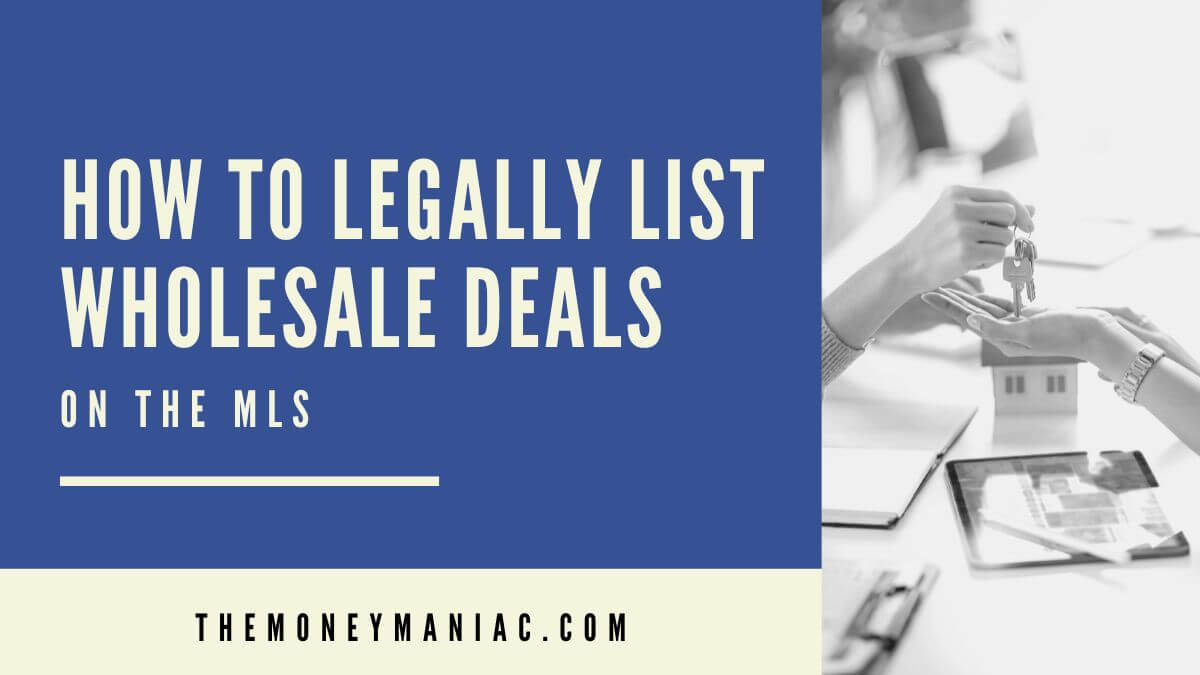Editor’s Note: The following is a guest post from Erin Hybart, a licensed real estate agent, house-flipper, and real estate mentor in Louisiana.
You jumped into real estate wholesaling to make some money. After all, the internet made it look easy. Just find a few motivated sellers, distressed properties, or undervalued homes and you can make thousands with almost no upfront capital.
Then you tried it. And the reality of finding a cash buyer hit you like a ton of bricks. The process isn’t as easy as it seemed. The real estate world is vast, and landing a cash buyer for your wholesale deals can be quite a challenge.
However, one tool that can streamline your efforts is the Multiple Listing Service (MLS).
Listing wholesale real estate deals on the MLS is the key to maximizing your assignment fee. So I put together this ultimate guide on exactly how to do it, legally.
If you’ve ever been interested in getting your wholesale deals onto the MLS… If you’ve been told that you can’t… Or if you are just stuck looking for a cash buyer to close your contract, you are in the right place.
How do I know all of this?
I am a licensed real estate agent in Louisiana and I have personally told tons of real estate wholesalers I was not able to list contracted properties on the MLS (because they were not the owner).
Little did I know, there was a way.
Now I am sharing what I have learned by working with investors across the U.S. to legally list wholesale real estate deals on the MLS. I have listed and helped close these properties, and after reading this article, you will be able to do the same.
How To Legally List Wholesale Deals On The MLS
Before I dive in, please note that this article does not offer legal advice. It only shares my personal experience in working with real estate investors.
The process to legally list wholesale properties on the MLS is all about what happens before the property even hits the MLS. You see, these initial steps are the key to the success of the entire deal. Once the property is listed, the wholesale process isn’t very different from a standard transaction.
To get started, you must obtain two secret weapons along with the traditional documents involved in a wholesaling business.
The first is a limited power of attorney for selling the property. The second is a Notice of Interest against the property.
But again, before implementing these suggestions, have a real estate attorney consult your local and state laws. If you hold a real estate license, you are required to uphold those rules and regulations. So it’s much better to ask a professional upfront than to pay for it later.
Before The Wholesale Process Begins: 3 Key Details
Understanding the proper wholesaling process is essential. This will help you identify potential risks, negotiate fair deals, build relationships, and avoid legal issues. Ultimately, having a strong foundation is the key to closing profitable wholesale real estate transaction deals.
The Benefits
Wholesaling in real estate involves a contract assignment.
- A wholesaler contracts a property from a motivated seller
- The wholesaler sells the contract to an end buyer
- The wholesaler keeps the difference in price (their wholesale fee)
This process allows wholesalers to turn a profit without ever owning the underlying property. This means wholesalers enjoy quick profits, minimal risk, and no ownership responsibilities.
The Regulations
Wholesaling laws can vary significantly depending on the jurisdiction (state or country) where the real estate transaction occurs. Some areas have specific regulations and requirements for wholesalers around disclosure and marketing tactics. Others may even require wholesalers to hold a real estate license.
The Primary Fear
A huge concern in real estate investing is that a property owner might circumvent the wholesale real estate contract and bypass their agreement with you as the wholesaler. This would deprive you of the profit you were expecting from the deal, and leave you emptyhanded for your hard work.
Don’t let this skepticism and misinformation derail your business plan.
Most of it arises because real estate wholesaling is a relatively new concept. But with the proper documents in place, you have nothing to fear.
That being said, be aware that property owners are often approached by others who try to scare the seller out of the contract. They may even claim that wholesaling is illegal.
Luckily, if you have been following this guide, you already consulted a local attorney. So you can either reassure the owners yourself or refer them to your contact for any further legal advice.
The 4 Stages Of A Wholesale Real Estate Deal

Now that you have a high-level understanding of how wholesale deals work, let’s get into the details. We will cover the contracting, listing, under contract, and closing phases of a deal, as well as the special documents to look out for.
1) Contracting Phase
The process of contracting a wholesale property is no different than what you already do. What is different is the additional documents you must obtain to list the property on the MLS.
There are two documents you will need here. And it is important to seek legal advice before utilizing these documents to ensure you follow the applicable laws of the state of the property.
Limited Power of Attorney
The first document you must obtain is a limited power of attorney to sell the property. A limited power of attorney for a real estate transaction is a legal document that grants someone the authority to act on behalf of the principal in a limited capacity during a particular real estate transaction.
This limited authority may include signing contracts, handling closing documents, or representing the principal in dealings related to that specific property transaction.
Notice of Interest
The second document you must prepare is a notice of interest against the property. This document will be filed with your local courthouse.
A notice of interest on a real estate property is a formal declaration that indicates someone has a legal or financial interest in that property. It serves as a public record and notifies potential buyers, lenders, or other parties about the claim or interest on the property.
2) Listing Phase
After landing a wholesale contract, you can seek a real estate agent to list the property. The listing phase is similar to a traditional sale, except the listing documents and other associated documents can be signed by the wholesaler (on behalf of the property owner) as per the limited power of attorney document.
At this stage, you will want to hire an investor-friendly real estate agent. Finding the right agent that understands wholesale real estate transactions and the world of real estate investments could take some time. You do not want an uninformed real estate agent sabotaging your deals.
Once the property is on the real estate market, the agent can begin employing various marketing efforts to sell the property.
3) Under Contract Phase
The “under contract” phase in a real estate transaction is a critical stage where the buyer and seller have agreed on the terms and conditions, and a binding contract is in place.
As the owner’s representative, you negotiate the contracts presented by the real estate agent. You must ensure you understand your responsibility as you represent the property owner.
What’s important to note during the “under contract” phase is that you (the wholesaler) negotiate the inspection, appraisal, earnest money, and other contingencies. And what you agree on during the negotiation process could fall on you. This may include bills, repairs, and more.
4) Closing Phase
When a property is ready to be closed, the notice of interest you filed on the property will be satisfied. This is when you get paid on your contract.
You will have to work with the title company to determine the seller’s net proceeds. Together you will calculate the exact amount of the notice of interest down to the cent.
The property owner may attend the closing and sign the documents or allow the wholesaler to sign on their behalf. The exact terms will be agreed upon by the parties involved.
Related reading: Real Estate Syndication 101: How To Find And Evaluate Deals
A “Real Life” Wholesale Example
Let’s walk through an example to demonstrate how powerful this process can be.
Susie the Seller has a distressed property and she needs $100,000 to walk away. Suzie is contacted by Ricky the real estate investor who understands the wholesale real estate process and offers to get Suzie her full asking price if she will contract him the property.
Ricky explains the context to Suzie to ensure she understands the process and is aware that the property may be formally listed. Ricky then gets all the paperwork on the property, including a limited power of attorney.
After assessing the comps, Ricky sees an opportunity to clean up the property and sell it to a local landlord. He invests $2,500 into cleaning, minor landscaping, and a paint job. Then, he consults with a real estate agent and lists the house for $160,000 on the MLS.
Once the wholesaler decides to list the property, Ricky files a notice of interest for $60,000 against the property. (Note: The final notice of interest amount will change based on the sales price and net proceeds owed to the seller at closing.)
An interested buyer makes an offer on the property, and the parties agree to a purchase price of $155,000. The inspection, appraisal, and other contingencies are fulfilled, and the property closes at the $155,000 sales price with net proceeds of ~$145,000 owed to the seller (for illustrative purposes).
The notice of interest is satisfied at the difference between the $145,000 net proceeds of the property and the $100,000 owed to Suzie. Ricky ultimately nets $42,500 ($145,000 – $100,000 – $2,500) with only a $2,500 initial investment.

Key Considerations To Legally List A Wholesale Deal On The MLS
Follow these best practices to legally list your wholesale deal and establish yourself as a trusted player in the local market.
1) Complete The Proper Paperwork
If you do not have the proper paperwork, you could lose your assignment fee. These documents will protect your interest in the property. So take the time upfront to get your ducks in a row. Once you have completed the process once, it will be much faster on subsequent deals.
2) Operate Transparently
Transparency in wholesaling real estate is crucial for building trust, staying ethical, and adhering to legal regulations. This ensures that all parties understand the terms upfront, and it reduces the risk of misunderstandings and disputes later.
Transparent dealings also help wholesalers maintain a positive reputation. It motivates sellers to work with them and leads to more successful and sustainable business relationships.
3) Verify The Owner
It may sound like common sense, but the actual owner of the property will need to sign all of the initial wholesale documents.
It is in your best interest to do your due diligence and verify the property’s owner before listing it for sale. You do not want to spend time and energy only to find out there is another owner on the property that could have easily been identified by a quick tax assessor search.
Alternatives To Listing Wholesale Real Estate Deals On The MLS

If, for some reason, you are not able to list your wholesale deals on the MLS, there are other ways to sell wholesale real estate contracts.
Network With Local Investors
Build relationships with other investors and attend networking events. Join local real estate meetups to find potential buyers interested in wholesale deals.
Post On Real Estate Forums
Advertise your wholesale deals on online real estate forums and platforms like BiggerPockets, Connected Investors, and Craigslist. These websites have sections dedicated to wholesale deals and attract a wide range of real estate investors.
Contact Your Email List
Once you have built a buyer’s list, you can use email campaigns to inform your contacts about new deals. Make sure to tease the deal to ignite a bit of interest.
Daisy Chain To Another Wholesaler
A daisy chain is a chain of contract assignments among wholesalers. It begins with a purchase agreement signed between a seller and the initial wholesaler (Wholesaler A). Subsequently, this wholesaler assigns the contract to another wholesaler (Wholesaler B). This strategy works well if Wholesaler B has a bigger buyer list or a specific contact for the property.
Partner With Real Estate Agents
Collaborate with real estate agents that have active investor networks, including house flippers. Strong agents often have a wealth of cash buyers and investors at their disposal.
Final Thoughts
The entire concept of wholesaling real estate has evolved quickly. While there is an opportunity to make a lot of money by wholesaling a discounted property, you must know the local laws of the property. This is especially true if you are doing virtual wholesaling.
And if there is one takeaway from this article it is this: You can list your wholesale property on the MLS with the proper documentation.
The keys are to know the local regulations, get your paperwork in order, and work with an experienced real estate agent.
Frequently Asked Questions
In general, yes! Wholesaling is considered legal when conducted within the boundaries of the law and in compliance with real estate regulations. However, these rules vary from jurisdiction to jurisdiction. So wholesalers must take the time to understand the specific laws and regulations that apply in their area of operation.
The answer varies depending on local regulations. In some areas, they may be allowed to engage in wholesaling if they disclose their licensed status. Other jurisdictions, however, have specific restrictions prohibiting dual agency and other ethical conflicts.
Some investors begin with wholesaling because it requires minimal upfront capital compared to traditional real estate investments. Wholesaling allows investors to profit from real estate transactions without owning the properties, making it an accessible entry point for those with limited funds or experience.
Unfortunately, some wholesalers do take advantage of desperate or uninformed sellers. Ethical wholesalers strive to create win-win situations for all parties involved. They understand that a good deal is one where the seller, buyer, and wholesaler all benefit.
Author Bio

Meet Erin, a real estate enthusiast with a wealth of knowledge and an insatiable curiosity for all things real estate. As a licensed real estate agent in Louisiana, Erin dedicates herself to assisting clients in buying and selling properties, as well as mentoring fellow agents in achieving success in their own Real Estate businesses.
Erin also channels her expertise into captivating house-flipping adventures. Her motto? “Less House, More Life!”
To read more from Erin, follow her at ReErin.com!



